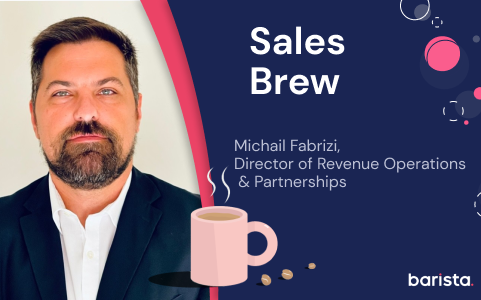CRM data automation: Sales Brew with Aparna Muralidharan, Sr. Director of Revenue Operations

Roy Weinstock
For the 11th episode of Sales Brew by barista AI, we had the opportunity of hosting Aparna Muralidharan, a Revenue Operations veteran at Dscout to talk about CRM data automation. We had a great practical discussion about CRM data quality and a strategic little deep dive into the role of RevOps in today’s world.
To watch the full interview and get updated on every sales brew episode, subscribe to our YouTube channel. A short version and transcription are below. Get a cup of coffee and enjoy the show!
How did you get into Revenue Operations?
After graduating from college, I began my career as an Administrative Assistant Secretary. While working in that role, I discovered a knack for analytics and began taking on projects from an administrative standpoint. Eventually, I landed a job doing corporate analytics for Penguin Group, where I gained experience in sales analysis and inventory planning.
From there, I transitioned to Medidata Solutions, a biotech company with an established revenue operations program. As part of the sales analytics team, I worked with over 300 reps and gained a deep understanding of how a well-oiled sales operations group should be structured.
Over the past five to six years, I’ve been working with various startups, helping them set up their revenue operations programs from scratch. I’ve worked in education, technology, cybersecurity, no-code application development, marketing technology, and now, I’m excited to be at Dscout, a market research tech firm, where I’m consolidating and improving their sales operations practices.
What are the first CRM data quality steps you’re taking in your new position?
There are a few audit-type checks I perform as the first steps for CRM data quality in my new position. Firstly, I look at the sales playbook, if there is one, or interview stakeholders and write one down if it’s not available. Then, I check if the things that need to be tracked in the sales process are actually being tracked in the CRM system. For example, if we have a MEDDIC methodology, are we multithreading our opportunities and bringing different stakeholders into the deal at the appropriate timing? If so, those contact roles should be added to the operations and all meetings and activities should be logged.
This can give insight into opportunity health scores, such as whether there is activity on the meetings that support the deal closing within the appropriate timeframe as listed on the close date. Additionally, I check whether the standard SaaS KPI metrics are being reported and tracked in terms of pacing against goals at any point in the quarter. Finally, I review the reporting suite to ensure that it’s aligned with industry best practices.
What are the most urgent CRM challenges you’re always facing?
one of the biggest challenges is ensuring that the data stays clean and up-to-date. Salespeople are often focused on closing deals and may not prioritize data entry, so there may be missing or incomplete information in the system Another challenge is ensuring that the sales process is consistently followed by the team. This includes tracking activities, updating opportunities, and ensuring that the right stakeholders are involved at the right time. Sometimes there can be resistance to change or difficulty in getting buy-in from the team to adopt new processes, which can hinder the effectiveness of the CRM. Lastly, integrating the CRM with other systems and ensuring that data flows seamlessly can also be a challenge.
Can you elaborate on CRM data automation and entry processes?
Yeah, so when it comes to maintaining good data hygiene in our CRM system, there are a few key protocols we follow. Firstly, every opportunity needs to have the correct close date and contact information, so we can properly track marketing attribution and lead sources. We also need to ensure that the opportunity is in the right stage, which is associated with a probability of closing that’s assessed based on historical conversion rates. Additionally, it’s important to have next steps listed in a timely manner and to ensure that we have sufficient pipeline coverage to meet our goals.
Please Elaborate on CRM data automation and CPQs
To achieve this, we need to ensure that the opportunity amount is accurate and listed appropriately, and if we have a CPQ in place for CRM data automation, we need to make sure that proposals are tracked and logged in the system. It’s also important to do trend analysis on what happens to quotes over time, such as if we send out a quote and what it means if we send out a second quote, and what has changed. By looking at the metrics and ensuring they are properly tagged, we can prevent errors and put in validation rules in the system.
To further maintain good data hygiene, I also put together data hygiene reports to flag common mistakes such as when next steps haven’t been updated in a week or when the appropriate sales stage hasn’t been given based on the close date. For example, if an opportunity is in an early stage, it’s unlikely to close on Friday.
Overall, by following these CRM data automation and entry protocols, we can ensure that our data is accurate, up-to-date, and reliable, allowing us to make more informed decisions and achieve our sales goals more effectively. This is how CRM data orchestration looks like.
Where reps are struggling when it comes to CRM data entry tasks?
One area where reps often struggle with CRM data entry tasks is adding and maintaining contact roles data hygiene for deals. This can be a tedious process, but it’s important to ensure that the relevant stakeholders at the client are listed both for billing purposes and for onboarding purposes. CRM data automation is crucial for this challenge. Additionally, reps should ensure that all discovery information gathered during the sales process is appropriately tagged in the system. Another important aspect of data entry is maintaining contact information such as phone numbers and emails, which is crucial when handing off deals to account management. These are just a few examples of the challenges reps may face with CRM data entry and can also cause to Salesforce duplicates.
How do you incentivize reps to follow through your CRM data protocols?
When it comes to incentivizing reps to follow through with our CRM data entry protocols, I use validation rules to ensure that the system won’t allow incorrect data entry. I also create reports to flag any issues, such as outdated next steps or inaccurate stages. In cases where we’re following a Medic protocol, I make sure that the right people are listed, such as the economic buyer and internal champion.
To further incentivize adherence to our data protocols, I publish leaderboards to highlight who has the cleanest data. If someone is struggling with data hygiene issues, I’ll work with them directly to clean up their data. I’ll set aside an hour to sit with them and provide instructions on how to clean up their data.
Lastly, I use CRM data automation to help streamline the CRM data entry process and reduce the likelihood of CRM errors.
Can you share some CRM data automation practices?
Definitely, sales activity tracking is crucial. Gong, for example, sync email to capture activity, as well as other CRM data automation tools. I have also used workflow automation in the system for automatic field updates. It’s important to ensure that all the systems are well integrated and talk to each other, and the user interface is clean and easy to use. These are some of the things that I do to ensure good CRM data quality and have all our information in one place.
What are the main RevOps trends you’re seeing?
As someone with a sales analytics background, I’ve seen a shift towards more automated reporting tools that can generate the reports I need out of the box, saving me a lot of time. There are also many more tools available now that automate processes that I used to have to do manually, freeing up my time to focus on more strategic aspects of the role. Additionally, there are now more resources, communities, and knowledge-sharing platforms available to RevOps professionals, allowing for the exchange of ideas and advice. This represents a positive development in a field that historically lacked the thought leadership necessary for streamlining innovation.
Can you recommend some Revenue Operations communities for RevOps?
Sure, I can definitely recommend some Revenue Operations communities for RevOps. One community that I am familiar with is the Revenue Operations Alliance, which is affiliated with the Sales Enablement Collective. Another community is the RevOps Co-op, which is a community of Revenue Operations professionals. Additionally, companies that offer services to Sales Operations professionals, such as Salesforce and Lean Data, also have their own communities. For example, Salesforce has the Trailhead and Trailblazer community, while Lean Data has the OpStars community. Lastly, the Wizard of Ops is a Slack group that I would recommend checking out as well.
How do you like your coffee?
I’m a big coffee fan and I love it. I’m actually addicted to it, to be honest. If I don’t have it, I get really cranky. I usually take it black in the mornings, but if I need an afternoon pick-me-up, I’ll go for an almond cappuccino.
To watch more from Sales Brew about CRM data automation and more:
- Episode 1: Sales Brew with Tyler Meckes, Account manager at Dooly
- Episode 2: Morgan J Ingram, Director of Sales Execution and Evolution at JB Sales
- Episode 3: James Buckley, Chief Evangelist and Master of Ceremonies at JB Sales
- Episode 4: Nieka Mamczak, Head of Sales Enablement at StackOverflow
- Episode 5: Sam Sweeny, Sales Operations Manager
- Episode 6: Benjamin Roach, Global Sales Operations Manager at Ardoq
- Episode 7: Elgun Aliyev, Salesforce Admin at CentralReach
- Episode 8: Amanda Harwood, Sales Operations Manager
- Episode 9: Jake Rasmussen, Salesforce Consultant
- Episode 10: Taylor Thomson, Director of Revenue Operations at Within
- Episode 11: Aparna, Sr. Director of Revenue Operations at Dscout


